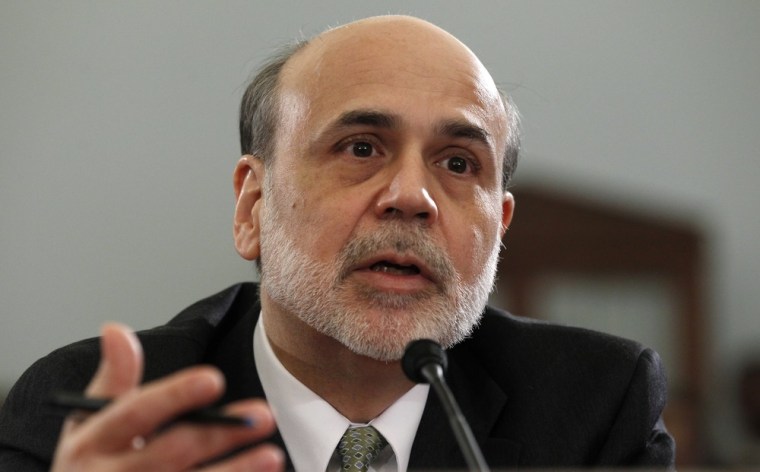Is inflation a growing threat or isn't it?
Federal Reserve Chairman Ben Bernanke thinks not, and he told a House Budget Committee meeting as much Wednesday even as lawmakers expressed worries about rising fuel and food prices in the United States and abroad.
The Fed might not see the inflation threat "until the cow is out of the barn" and inflation is spreading through the U.S. economy, warned committee chairman Paul Ryan, R-Wis.
“There is nothing more insidious that a country can do to its citizens than debase its currency,” Ryan said.
But Bernanke countered that while inflation is surging in emerging economies, there was little risk of it in the U.S.
“Inflation is expected to persist below the levels that Federal Reserve policymakers have judged to be consistent” with their mandate, Bernanke told lawmakers.
In his first appearance before the House since Republicans took control last month, Bernanke said the Fed is confident about continuing its plan, launched last November, to buy $600 billion in government debt to keep a lid on long-term borrowing costs.
The program has drawn ire from many policymakers in emerging markets, who have accused the United States of unfairly driving down the value of the U.S. dollar to boost exports. At home, many Republican lawmakers in Congress have attacked the program as potentially sowing the seeds of inflation.
Bernanke's inflation outlook was a tough message to deliver amid headlines of rising food and commodity costs across the globe. Recent turmoil in Tunisia that led to the downfall of the government was fomented by higher food prices.
Bernanke said expectations of future inflation had remained “stable,” suggesting little worry an inflationary psychology was building despite rising gasoline costs in the U.S.
Rep. Todd Rokita, also a Republican, seemed skeptical of the Fed's ability to fend off inflation before it gets out of hand. In the Fed's history, when did the Fed "get it right?" Rokita asked.
Bernanke said former Fed Chairman Paul Volcker brought down double-digit inflation during the 1980s by pushing up interest rates to levels not seen since the Civil War.
The Fed chief said he was confident the Fed has the political will to boost interest rates and snuff out inflationary forces before they take hold.
In prepared remarks, delivered before the hearing, Bernanke said the drop in unemployment over the last two months is encouraging, but cautioned that it will take several years for hiring to return to normal.
Bernanke expressed more confidence in U.S. economic growth, but he also warned that failing to forge a plan to reduce the government’s $1 trillion-plus deficits over the long term could eventually hurt the economy.
The nation’s unemployment rate was 9 percent in January after the fastest two-month decline in 53 years. In his testimony Bernanke said that recent declines “provide some grounds for optimism on the employment front.” Bernanke also said high unemployment and low inflation call for continued support from the Fed.
Lawmakers from both parties were expected to aim to get Bernanke to back their solutions for reducing the government's $1 trillion-plus budget deficits. Ryan has promoted budget cuts as the way to reduce deficits.
Persistent budget deficits will prompt investors to demand higher yields on government debt, causing interest rates to soar, Bernanke has said. Higher borrowing costs would crimp spending by consumers and businesses, slowing economic activity, he's warned.
Last week, Bernanke stepped into the political debate over the nation's debt limit.
The Fed chief warned congressional Republicans not to "play around with" the Treasury Department's request to boost the government's borrowing authority beyond the current $14.3 trillion statutory cap. House Republicans have vowed to make deep spending cuts a precondition for voting to raise the debt ceiling.
The department has asked Congress to let it borrow more so it can continue to pay its bills. In the unlikely event that Congress denied the request, the U.S. government would be at risk of defaulting on its debt.
Bernanke, in remarks last week to the National Press Club, said the implications would be catastrophic. He urged Congress not to use the debt limit as a "bargaining chip" in broader discussions about reducing the government's deficits.
Bernanke also said the recovery still needs help from the Fed despite signs of improvement.
The economy is strengthening, and will likely grow at a faster pace this year as more confident consumers and companies spend more, Bernanke said, but he also warned that the growth won't be strong enough to quickly drive down high unemployment, and it could take several years before it returns to more normal levels.
At the same time Bernanke was testifying, Republican Rep. Ron Paul held a hearing on whether the Fed's bond-buying program and record-low interest rates can really help create jobs. Paul, an outspoken critic of the central bank, favors abolishing the Fed.
Lawmakers at that hearing also expressed concerns that the Fed's policies will spur inflation.
"If the Fed didn't see this mess coming, will they see the recovery starting in time to turn off the printing presses to stop inflation," asked Rep. Frank Lucas. "I am not sure their vision in the future will be any better than in the past."
